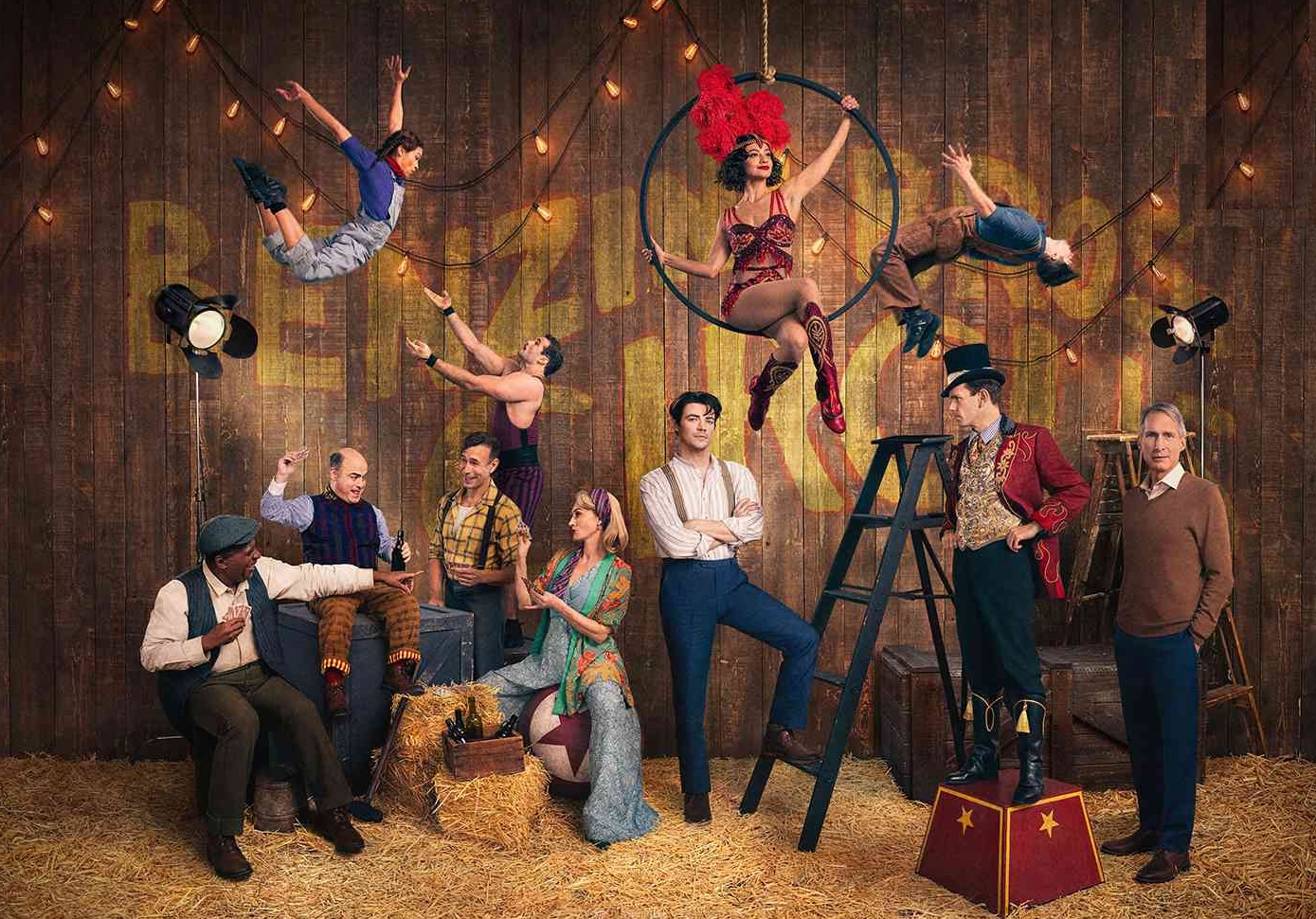WATER FOR ELEPHANTS
(Triggering vs Earning—Part 4)
Book by Rick Elice
Music and Lyrics by PigPen Theatre Co.
Based on the novel by Sarah Gruen
Directed by Jessica Stone
Imperial Theatre
Official Website
Reviewed by David Spencer
Water for Elephants is a musical adaptation of the novel by Sara Gruen, a memory story as an old man (Gregg Edelman) recalls his twentysomething self (Grant Gustin) having run from a family tragedy and winding up joining a circus as an unlicensed, formally untrained, but nonetheless gifted veterinarian. There’s his boss, a savvy but manipulative ringmaster (Paul Alexander Nolan), the beautiful wife the boss abuses (Isabelle McCalla); and the inevitable love triangle. Said wife is also the star performer, stage companion to the newly acquired elephant, Rosie.
And Rosie, without being a live cast member, is nonetheless a living presence…and I’ll get back to that.
Basics first: The show is as expertly cast as performed. The leads are right in the type-look-and-vibe slot for this kind of genre story, which is harder to pull off than some might think. And one of its triumphs is also one of its contradictions. As the old man who has escaped from his nursing home—much as he ran away from home decades before—Gregg Edelman is charming, engaging and a perfect guide into the storytelling universe, telling his tale to the new runners of the legacy circus (and implicitly to us too). And the character’s competence makes you wonder—perhaps only in the back of your mind, and for me, almost immediately—why and how an old man this sharp, this able to observe and get around, this articulate, wound up “captive” in a nursing home to begin with. And in subsequently reading a synopsis of the source novel and and its film adaptation (neither of which I knew previously), the answer turned out to be: he wasn’t originally so conceived. But in making him just that little bit younger, just that much more capable of self-sufficiency, the musical adapters have made the telling of his story more urgent—and upped the ante on the denouement’s catharsis. I don’t want to say how—spoiler—but it’s hugely important.
Which brings me back to the “casting” of the elephant. Again, I don’t want to describe the stage technique per se—visual spoiler—but director Jessica Stone and her design team have devised a way to build the pachyderm’s personality from a suggestion to a full-blown manifestation. Another kind of catharsis. I’ll reluctantly risk what probably isn’t much of a spoiler by revealing that it involves human-operated puppetry (co-designed by the team of Ray Wetmore & JR Goodman and Camille Labarre). Also important.
And why? Because both these choices are about fulfilling audience expectation with nothing but the kind of stagecraft that goes back centuries. The show, in that way, celebrates the spirit of circus life and performance. Granted, what’s on display at the Imperial is a big-budget Broadway production that makes ample use of modern technology to enable visual fluidity, maximize sound design, etc. But if you took all that stuff away and just presented the same script, score—and puppetry to similarly building effect—in a black box…the story could be told as effectively, and the score be as affecting.
Caveats? Well…on first hearing (my own mileage may vary upon repetition) the score isn’t a great one; but it’s a good one. It hits its marks properly and authentically, suggesting the music of era and locale by borrowing its vocabulary to inform a timeless sensibility. And there is, alas, one BS ballad in the money-notes/triggering mode—BS because it comes at a juncture without tension; it just amps up an inevitable consummation and stops the action cold, without even amplifying character. Not that the show doesn’t deserve its big ballad, but for goodness’ sake, create one that earns its dramatic keep. That said, call it a minor infraction. One that can be fixed down the line if the creative team cares to.
Meanwhile, Water for Elephants is water for the restless musical theatre aficionado looking for something to remind him- or herself that even if they don’t exactly make ‘em like they used to, they sometimes make ‘em so that you can see where they at least have intimate regard for the classic footsteps they’re following.
Triggering vs Earning
(More parts to follow)
